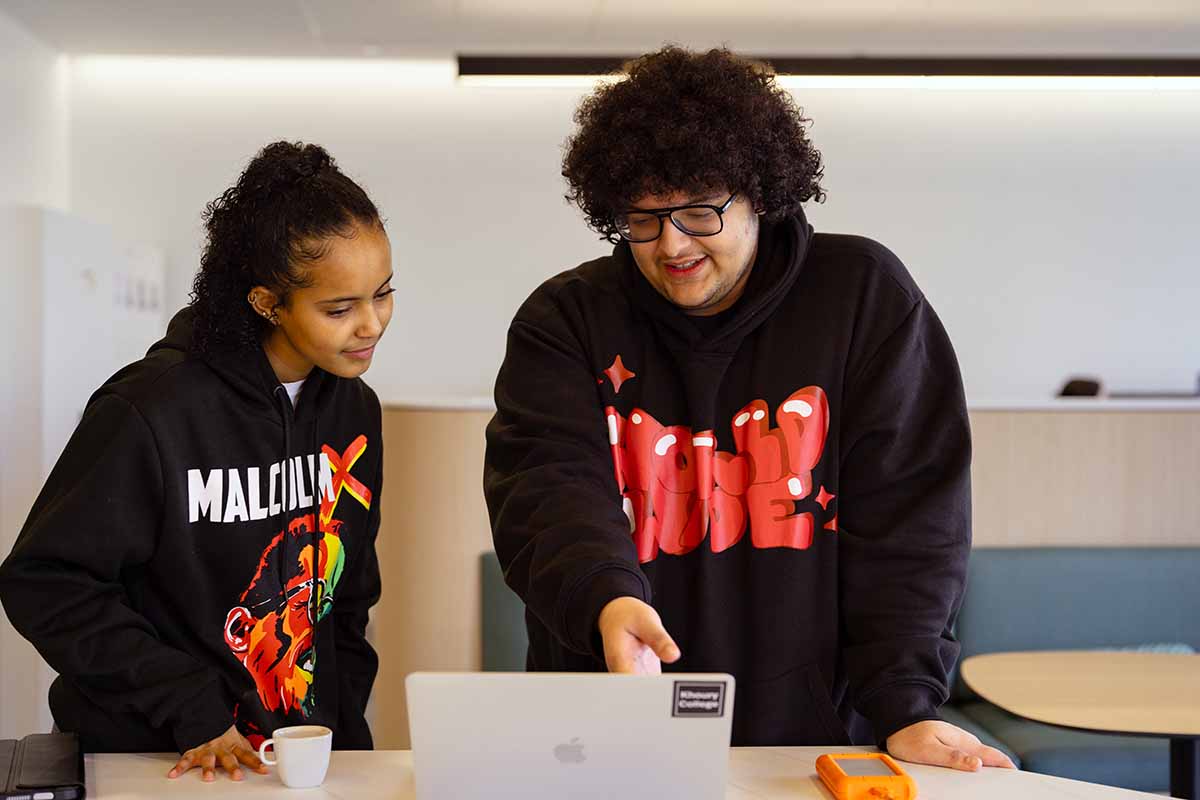
Undergraduate Co-op Policies
Khoury College has established co-op eligibility guidelines designed to set you up for success. These are in addition to Northeastern’s co-op eligibility guidelines.
This page contains the following information:
Co-op eligibility requirements
Working diligently both on your own and with the support of your coordinator, there are a handful of steps you must take to participate in co-op. These are known as co-op eligibility requirements. If you have additional questions, reach out to your co-op coordinator.
Step 1: Academic progress
Before searching for a co-op, you must maintain a 2.0 GPA and complete or be enrolled in at least one of the following third-semester courses, as it corresponds with your program of study:
- Data Science: Foundations of Data Science or Advanced Programming with Data
- Cybersecurity: Computer Systems
- All other Khoury programs:
- Object Oriented Design (if you joined Khoury Fall 2019 or later)
- Object Oriented Design or Algorithms and Data (if you joined Khoury before Fall 2019)
In addition, during a co-op search semester students need to be enrolled in and complete a minimum of 12 credits to demonstrate active progress in their program. Students enrolled in fewer than 12 credits will not be eligible to search for co-op.
Students must also meet the following academic requirements:
- Completed 3-4 full-time semesters as an enrolled student, according to their assigned pattern of attendance (POA); exceptions include transfer students as follows:
- Global Scholars (completed 1-2 full-time semesters as an enrolled student, according to their assigned POA)
- N.U.in (completed 2-3 full-time semesters as an enrolled student, according to their assigned POA)
- External transfer (completed 1-3 full-time semesters as an enrolled student, according to their assigned POA)
- No outstanding disciplinary or academic probation issues
Step 2: Professional Development Course
In addition to progressing through program course work, you must successfully complete — or be in the process of completing — Professional Development for Khoury Co-op (CS1210). Completing an equivalent course in another college at Northeastern is also acceptable.
Waiving CS1210
In exceptional cases, students can petition to waive CS1210 by submitting an appeal assuming the following conditions are met:
- Student has completed a minimum of 55 days working at a minimum of two work experiences.
- Each experience must be at least 8-10 weeks in length
- Provide a job description and reference from former employer(s).
- Provide a thorough and comprehensive write-up (500 words minimum) on why the course should be waived from their requirements, citing success in their job search and work experience, in addition to overall professional conduct throughout both.
- Student should receive a copy of CS1210 Syllabus to give specific examples that tie to the course content.
If a waiver for CS1210 is granted, students must:
- Maintain and adhere to all other Khoury co-op eligibility guidelines and expectations to participate in the co-op program.
- Meet with their academic advisor to understand the impact of the waived course and how to make up the one credit if needed.
Pattern of attendance change policy
Students requesting to change their Pattern of Attendance (POA) at any time must meet with their Khoury Academic Advisor.
In situations where changing a POA will affect a student’s graduation date or will not align with an assigned pattern for their major, they will have to petition to change their pattern. Khoury Academic Advisors will support students through the petition process.
The following deadlines must be followed if a pattern change would result in a student looking for a co-op for the following semester:
- Spring Co-op: the day after Indigenous People’s Day in October
- Fall Co-op: the day after President’s Day in February
Beyond these dates, students would need to petition to the Undergraduate Co-op team to see if a pattern change can be accommodated and if they would be permitted to search for the following semester.

Co-op coordinator assignments for students changing their home college to Khoury College
Students changing their home college to Khoury by the day after Indigenous People’s Day in October and seeking a Spring co-op will be assigned to a Khoury co-op coordinator. Students must also have completed the prerequisite courses. Students who switch their major to a Khoury major after this deadline should continue to work with their co-op coordinator in their original program.
Students changing their college to Khoury by the day after President’s Day in February and seeking a Fall co-op will be assigned to a Khoury co-op coordinator. Students must also have completed the prerequisite courses. Students who switch their major to a Khoury major after this deadline should continue to work with their co-op coordinator in their original program.
Professional standards
Students are expected to adhere to the highest standards of professional behavior during their job search and while on co‐op. Khoury College has established a specific set of rules, and students are required to read, initial, and follow the Professional Standards Agreement (PSA) form prior to every co-op experience. Policies within the PSA are outlined in detail and include but are not limited to expectations regarding communication with your co-op coordinator, professionalism during the search and when accepting or declining an offer, behavior on the job, and more.
Please note some co-op employers require physical exams, criminal background checks, security clearances, drug testing, and/or other screenings prior to and during employment. Failure to complete or pass these types of qualifying screenings may impact your offer and eligibility.
Students who fail to meet expectations outlined in the PSA may be subject to academic or disciplinary action. Consequences may include but are not limited to:
- Loss of co-op eligibility for future co-op cycles
- Unsatisfactory grade for co-op
- Lack of eligibility for future awards or scholarships offered by the college
- Additional disciplinary action
If students wish to complete a co-op or continue searching for a co-op following a violation of the PSA, they must submit a co-op appeal which is prompted by contacting their co-op coordinator.
Supplemental work while on co-op
While working on co-op, students must abide by the policies of the co-op employer. Should they wish to pursue additional work outside of co-op, they’ll need to establish that there is no conflict of interest with the co-op employer. International students must check with the Office of Global Services before accepting work outside of co-op.

Taking courses while on co-op
Co-op jobs are full-time demanding positions, so we don’t recommend students taking classes during co-op. You should discuss the need to take a course and the registration process with your co-op coordinator. The following requirements must be met:
- Confirm with your academic advisor that taking a class during a co-op semester is necessary.
- Inform and gain approval from your co-op job supervisor, particularly if the class impacts work hours. If approved, develop a plan to fulfill your work responsibility.
- During discussion with your co-op coordinator, communicate the reasons for taking a course during co-op and the course meeting time, as well as the job supervisor’s name, phone number, company name, and whether the supervisor has given approval.
- Talk to your financial aid counselor to determine additional cost per semester and how this may affect your personal financial situation.
- If your manager has approved one course on co-op, you can register online without a petition. You must complete “I Am Here” at the appropriate time.
To take two classes during co-op, you will also need to:
- Have an academic reason that will affect graduation date
- Have a minimum 3.2 GPA
- Have prior co-op experience
- Receive approval from your co-op coordinator and academic advisor
- Fill out a Petition Registration Form
- Complete “I Am Here” at the appropriate time, if your petition is approved
Because of the demands of full-time co-op work and two classes of academic coursework, such approval is rare and the decision to approve will depend on your manager’s input, your co-op progress, past employer evaluations, and your academic record.
Ending co-op early or beginning co-op late
Rare cases of a co-op ending before the scheduled end date include an unsafe work environment, a lack of relevant/agreed-upon work, or health-related issues. If you find yourself in a situation like this, contact your co-op coordinator immediately; they’ll assist you in reaching a resolution between you and the employer.
Students who fail to complete a co-op position without their co-op coordinator’s approval, including ending co-op early or starting co-op late, may be subject to academic or disciplinary action. This may include loss of co-op eligibility for future co-op cycles, limited access to a future co-op search, unsatisfactory grade for co-op, lack of eligibility for future awards or scholarships offered by the college, or additional disciplinary action.
Back-to-back co-ops and co-op extensions
Because student status and academic progress may be impacted, back-to-back co-ops are approved only in rare situations. In such cases, approval must come from your co-op coordinator, academic advisor, as well as the Office of the Provost.
Back-to-back co-ops are defined as going on co-op in consecutive Fall/Spring or Spring/Fall terms. If you’re requesting to go on a back-to-back co-op, you must submit a co-op appeal. Reach out to your co-op coordinator to begin the process.
Co-op extensions, which allow you to remain at co-op for a longer period, are permitted over the summer months. A co-op appeal is not required for any extensions or shortenings of co-op in summer terms.
However, if you do plan to extend into the summer terms, request permission in writing from your co-op coordinator at least two weeks prior to the start of the extension. Notify your academic advisor as well, since an extension could impact your expected graduation date. If you are an international student, a co-op extension will also require that your I-20 is updated with accurate start and end dates. To begin this process, submit a CPT Update Form on the Office of Global Services website. International students who extend their co-ops without receiving proper work authorization risk violating their visa status, which could lead to consequences out of the college’s control.
For more information, read the co-op requirements information in the Northeastern catalog.

Graduating immediately following a co-op
Graduating immediately following a co-op is not permitted, even if the student is enrolled in a course alongside the co-op. Students should always be enrolled in at least one course following their final co-op. For more information, read the co-op requirements information in the Northeastern catalog.
Academic probation and co-op
Students placed on academic probation I during a semester in which they are searching for a co-op
Students may go out on co-op if they have already accepted a co-op offer before being placed on academic promotion I, but must complete an academic plan with their academic advisor before their next search can begin. Students who have not accepted an offer must complete a co-op appeal to continue the search. Students not continuing to search must inform their co-op coordinator and meet with their academic advisor to complete a plan before restarting their co-op search the following semester.
Students placed on academic probation I during a semester in which they are not searching for a co-op
Students must complete an academic plan with their advisor prior to starting their next co-op search. Students will have restricted access to NUworks until this plan is completed.
Students placed on academic probation II at any time
Students on academic probation II are not permitted to search for co-op under any circumstances.
Co-op following a leave of absence
Going on co-op immediately following a leave of absence (LOA) is not permitted. For more information on returning to campus following a LOA, visit the registrar’s website.
Completing a third co-op
Students who wish to complete a third co-op must petition to do so. See the co-op appeals process section below for more information. Students wishing to complete a third co-op may only petition once they’ve completed at least two months of their second co-op.
Repeating or postponing a consecutive co-op search

Students who search for co-ops and are unsuccessful in landing one may have the opportunity to postpone their co-op search to the next consecutive term, though this option is not guaranteed. Not securing a co-op for your planned semester will require a pattern of attendance (POA) change. Students must work with their academic advisor to determine the appropriate new pattern based on their program and adjusted academic plan. The maximum number of consecutive co-op searches a student may conduct (after not landing a co-op on each search) is three. Upon three unsuccessful co-op searches, students must fulfill their experiential learning requirement using an alternative option and can work with their academic advisor to discuss options on how to meet this requirement.
Co-op appeals process
Students found to be ineligible for co-op or who wish to have an exception to an established policy above may appeal to the Khoury Undergraduate Co-op Standing Committee.
To begin this process, contact your co-op coordinator to receive guidelines on how to submit a co-op appeal, which will require you provide detailed rationale and explanation as to why you believe an exception should be granted. Upon receiving your appeal, an Appeal Decision Committee member will recommend an appropriate course of action, which is final and binding for all parties. The Appeal Decision Committee consists of college senior leadership and any other necessary stakeholders. Most students can expect to hear their appeal decision within one to two weeks after submitting it.